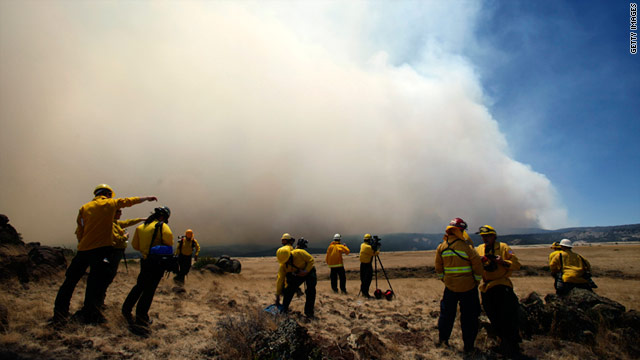 (CNN) -- Relentless winds that have driven an Arizona wildfire into the record books are expected to slow down Thursday, possibly giving firefighters a chance to start reversing a defensive battle against the 10-day blaze.
(CNN) -- Relentless winds that have driven an Arizona wildfire into the record books are expected to slow down Thursday, possibly giving firefighters a chance to start reversing a defensive battle against the 10-day blaze.
Relief could not come soon enough. Late Wednesday, fire officials reported that the blaze had moved into the town of Greer, which had already been evacuated. The extent of the damage was unknown.
The National Weather Service has lifted the "red flag" fire alert for eastern Arizona and is forecasting winds of between 7 mph and 17 mph Thursday with gusts of up 21 mph just north of the fire line. That's notably weaker than the sustained 20 mph winds and gusts of up to 40 mph that, along with low humidity levels, have bedeviled firefighting efforts in the area in recent days.
Jim Whittington, public information officer for the Southwest National Incident Management Team, noted the improved weather forecast at a press conference late Wednesday. However, he called the forecast for calmer winds "nothing to sneeze at."
"Don't get complacent just because we don't have a red flag warning," Whittington said. "Ten to 15 mile an hour winds are good winds to drive fire, especially through grass. So we're going to have to be very careful."
The Wallow Fire, as the blaze is called, has scorched 389,000 acres, leaving a giant bearpaw-like burn mark on the map of eastern Arizona.
That number is expected to grow later Thursday morning after an overnight flyover to assess the latest damage caused by what has become the second-worst wildfire in state history, fire officials said.
So far, the blaze has threatened 588 structures and destroyed 11, according to fire officials.
Wednesday was a tough day for firefighters as the huge wildfire threatened to grow, prompting the Apache County Sheriff's office to order the full evacuations of two towns, home to about 8,000 people.
Residents of Eagar and Springerville received the order late Wednesday afternoon, officials said. Other communities were warned they could be next.
"Today was a fairly dramatic run," Whittington said of the fire's movement on Wednesday.
While firefighters battled the fast-moving blaze, residents in its path faced serious choices: whether to stay -- and what to take with them if they leave.
"We're going to get out of here because they want us out of here. That's the main reason," said Eagar resident Bob Meador. "We don't want to go."
Authorities have evacuated thousands of people since the wildfire began sweeping through the Apache National Forest on May 29.
It is also threatening New Mexico, where residents have felt the effects of smoke and ash. A firefighting team will operate out of Reserve, New Mexico, Whittington said.
On Wednesday, the front of the fire was just three miles away from the Meador family's home.
Bob Meador and his father, Rodney, loaded what they could into a pair of pickup trucks.
"We packed up a bunch, we're just hoping it ain't going to burn, hoping and praying," Rodney Meador said.
But not everything fit, forcing them to make tough decisions. The Xbox made the cut, but family photos stayed behind.
Their 18-year-old dog, Tigger, got a seat in the cab of the truck, but the family cat remained at home.
Firefighters are focusing on saving homes in Eagar and nearby Springerville. But Bob Meador said he wasn't ready to take any chances.
As smoke filled their neighborhood, the Meadors hit the road, hoping they would have a home to return to.
"I've seen them wildfires in California just rip through places, so that's what I worry about," Bob Meador said.
Next-door neighbor Dave Hunt, speaking before the evacuation order, said he was determined to stay, and was putting his faith in the roughly 2,500 firefighters battling the blaze.
Earlier this week, Hunt -- a butcher at a local supermarket -- prepared 2,000 pounds of hamburger to feed fire crews.
"We have so many firefighters here that are so into their jobs and the have protected other small communities that I know they are going to do a good job protecting Eagar," he said.
If conditions get worse, he said, he'll join the steady stream of residents heading for safer ground.
"I'm not a dummy. When the wind shifts, when the ash starts to get heavy, when the smoke changes, it's time to go," he said.



